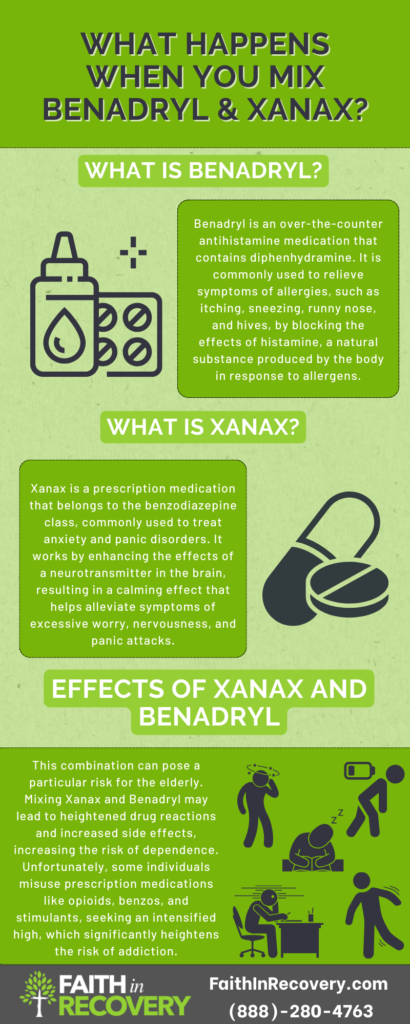
Top 10 Sober Valentine’s Date Ideas
February 4, 2021
Link Between Weight Loss and Drug Addiction
February 24, 2021
Top 10 Sober Valentine’s Date Ideas
February 4, 2021
Link Between Weight Loss and Drug Addiction
February 24, 2021
Benadryl and Xanax: A Deadly Combination
As a Christian drug rehab that’s helped numerous individuals recover from prescription drug abuse, we know that a lot of people either experiment with combining medications or don’t realize the harm they can do. While people may be aware of the dangers of binge drinking or abusing drugs like cocaine or heroin, not everyone thinks twice about the effects of mixing common over-the-counter and prescription medications like Benadryl and Xanax. Today we’re exploring the short and long-term dangers of using Xanax and Benadryl together.
What Is Benadryl?
Benadryl is the brand name for diphenhydramine, which is an antihistamine used to treat allergies, hay fever, and cold symptoms. Benadryl can treat symptoms like rashes, itching, runny nose, and cough. It’s also used for colds because it can help you fall asleep and stay asleep.
Benadryl works by blocking histamines, which are chemicals that your immune system releases in an attempt to rid itself of an allergy. As an antihistamine, Benadryl is specifically designed to alleviate symptoms caused by these chemicals.
Although this over-the-counter medicine can help alleviate uncomfortable symptoms, it can be dangerous in high doses. Some possible side effects of Benadryl include:
- Dry mouth
- Dizziness
- Constipation
- Stomach pains
- Blurred vision
- Dry throat
- Confusion
- Irregular heartbeat
While it’s not considered to be physically addictive in the same way that opioids and benzodiazepines are, Benadryl can be psychologically addictive due to its main ingredient, diphenhydramine. As an over-the-counter medicine, many people have access to it in tablets, capsules, and liquid form.
Additionally, while a severe physical addiction may not occur as a result of long-term Benadryl use, the individual is likely to want to try other substances or a combination of drugs. In a way, Benadryl may act as a gateway drug.
For example, cough syrups and OTC medications like Benadryl may be combined with soda and alcohol to create a concoction known as “purple drank” or “lean.” The drink creates an intense sense of relaxation, making it a popular recreational substance.
Social media also plays a role in the misuse of OTC drugs. For instance, a Benadryl TikTok challenge circulated the app recently, in which young teens would purposely overdose on the medication.
What Is Xanax?
Xanax, or alprazolam, is a prescription medication used to treat anxiety, panic disorders, and insomnia. It belongs to a class of drugs called benzodiazepines, which work by targeting nerve activity in the central nervous system to produce calming effects.
Xanax enhances an inhibitory transmitter in the brain called gamma-aminobutyric acid (GABA), which blocks certain brain signals and reduces nerve activity in the brain. Individuals who suffer from overactive nerves, like those with anxiety disorders, can benefit from Xanax.
Like many other benzos and prescription drugs, however, Xanax is addictive and can cause serious side effects when abused.
Some adverse side effects of Xanax include:
- Dizziness
- Hallucinations
- Slurred speech
- Loss of coordination
- Issues with memory
- Trouble breathing
Although these symptoms usually occur when Xanax is taken in extreme doses, people who develop a tolerance to it will take a higher dosage more often in order to experience the same effects. This can quickly turn into dependency. Prescription pill addiction treatment is often the most effective form of help for people with a Xanax addiction.
Can You Take Benadryl With Xanax?
 No, you should not take Benadryl and Xanax together. Taking Xanax and Benadryl together can intensify side effects like dizziness, fatigue, drowsiness, inability to
No, you should not take Benadryl and Xanax together. Taking Xanax and Benadryl together can intensify side effects like dizziness, fatigue, drowsiness, inability to
concentrate, and lack of coordination. Combining the two can be especially dangerous for the elderly.
Like many drug reactions, the effects of either medication can be intensified, or their combined side effects could cause a horrible chain of physical reactions. The number one reason you should not take Xanax and Benadryl together is that they can both lead to dependence.
Unfortunately, many people combine prescription medications with other OTC or prescription drugs to experience an intense high. In cases where opioids, benzos, and stimulants are heavily misused, addiction is bound to occur.

